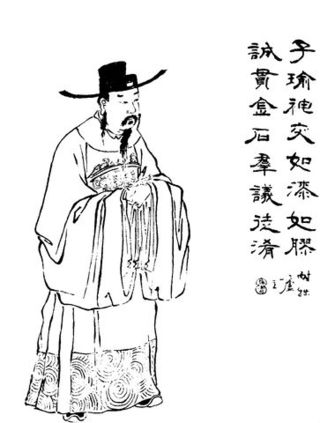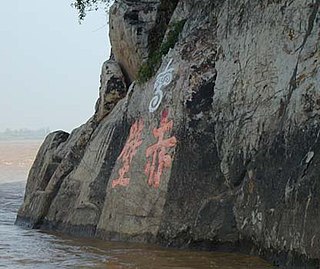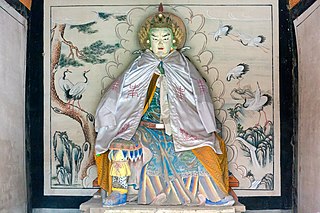
Sun Quan, courtesy name Zhongmou (仲謀), posthumously known as Emperor Da of Wu, was the founder of Eastern Wu, one of the Three Kingdoms of China. He inherited control of the warlord regime established by his elder brother, Sun Ce, in 200. He declared formal independence and ruled from November 222 to May 229 as the King of Wu and from May 229 to May 252 as the Emperor of Wu. Unlike his rivals Cao Cao and Liu Bei, Sun Quan was much younger and governed his state mostly separate of politics and ideology. He is sometimes portrayed as neutral considering he adopted a flexible foreign policy between his two rivals with the goal of pursuing the greatest interests for the country.

Zhuge Liang, also commonly known by his courtesy name Kongming, was a Chinese statesman, strategist, and inventor who lived through the end of the Eastern Han dynasty and the early Three Kingdoms period (220–280) of China. During the Three Kingdoms period, he served as the Imperial Chancellor of the state of Shu Han (221–263) from its founding in 221 and later as regent from 223 until his death in September or October 234.

Liu Biao, courtesy name Jingsheng, was a Chinese military general, politician, and warlord who lived in the late Eastern Han dynasty of China. He is best known for serving as the governor of Jing Province from 192 until his death in 208. He was also a member of the extended family of the Han emperors through his ancestor Liu Yu, the fifth son of Emperor Jing. Liu Biao was described as a handsome man and was over eight chi tall.

The Battle of Changban was fought between the warlords Cao Cao and Liu Bei in October 208 in the late Eastern Han dynasty of China. The battle took place at Changban.

Zhuge Jin, courtesy name Ziyu, was a Chinese military general and politician of the state of Eastern Wu during the Three Kingdoms period of China. Born in the late Eastern Han dynasty, Zhuge Jin started his career in the 200s as an official under the warlord Sun Quan, who later became the founding emperor of Eastern Wu in the Three Kingdoms period. In 215, he served as Sun Quan's representative in a territorial dispute over southern Jing Province between Sun Quan and his ally, Liu Bei. In 219, he joined Sun Quan's general Lü Meng in an invasion of Liu Bei's territories in Jing Province after Sun Quan broke the Sun–Liu alliance. He was subsequently appointed as a general and commandery administrator. Before the Battle of Xiaoting of 221–222, Zhuge Jin attempted to dissuade Liu Bei from going to war with Sun Quan but was unsuccessful. The battle ultimately concluded with victory for Sun Quan's side; both sides made peace later and reestablished an alliance between the Eastern Wu and Shu Han states against their rival state, Cao Wei. From 222 until his death in 241, despite being rather incompetent in military affairs, Zhuge Jin served as one of Eastern Wu's top generals and participated in some battles against Cao Wei forces.

Xu Shu, courtesy name Yuanzhi, originally named Xu Fu, was a Chinese politician of the state of Cao Wei during the Three Kingdoms period of China. He was born in the late Eastern Han dynasty and used to be a vigilante swordsman in his early life. However, after running into trouble with the authorities, he renounced his old ways and took up scholarly pursuits. He lived a reclusive life from the 190s to mid-200s in Jing Province, where he met and befriended Zhuge Liang. In late 207, he became an adviser to the warlord Liu Bei and served under Liu for about a year. He also recommended Zhuge Liang to Liu Bei during this period of time. In late 208, Liu Bei was defeated at the Battle of Changban by his rival Cao Cao. Xu Shu's mother was captured by Cao Cao's forces during the battle. Feeling lost and without a sense of direction, Xu Shu eventually left Liu Bei and joined Cao Cao. He continued serving in the state of Cao Wei – founded by Cao Cao's son and successor, Cao Pi, who ended the Eastern Han dynasty – and died of illness in office.
Cai Mao (fl.190-208), courtesy name Degui, was a military officer serving under the warlords Liu Biao and Cao Cao during the late Eastern Han dynasty of China.

The Battle of Red Cliffs, also known as the Battle of Chibi, was a decisive naval battle in China that took place during the winter of AD 208–209. It was fought on the Yangtze River between the forces of warlords controlling different parts of the country during the end of the Han dynasty. The allied forces of Sun Quan, Liu Bei, and Liu Qi based south of the Yangtze defeated the numerically superior forces of the northern warlord Cao Cao. By doing so, Liu Bei and Sun Quan prevented Cao Cao from conquering any lands south of the Yangtze, frustrating Cao Cao's efforts to reunify the territories formerly held by the Eastern Han dynasty.

Zhuge Liang's Northern Expeditions were a series of five military campaigns launched by the state of Shu Han against the rival state of Cao Wei from 228 to 234 during the Three Kingdoms period in China. All five expeditions were led by Zhuge Liang, the Imperial Chancellor and regent of Shu. Although they proved unsuccessful and ended up as a stalemate, the expeditions have become some of the best known conflicts of the Three Kingdoms period and one of the few battles during it where each side fought against each other with hundreds of thousands of troops, as opposed to other battles where one side had a huge numerical advantage.
Wen Ping, courtesy name Zhongye, was a military general who lived during the late Eastern Han dynasty and Three Kingdoms period of China. During his tenure as a general under the warlord Cao Cao, he was credited with defeating the enemy general Guan Yu and defending Cao Cao's interests in Jiangxia Commandery from the eastern warlord Sun Quan.

The end of the Han dynasty was the period of Chinese history from 189 to 220 CE, roughly coinciding with the tumultuous reign of the Han dynasty's last ruler, Emperor Xian. It was followed by the Three Kingdoms era. During the end of the Han dynasty, the country was thrown into turmoil by the Yellow Turban Rebellion (184–205). Meanwhile, the Han Empire's institutions were destroyed by the warlord Dong Zhuo and fractured into regional regimes ruled by various warlords, some of whom were nobles and officials of the Han imperial court. The warlord Cao Cao took control of Emperor Xian and his court in 196 and began gradually reunifying the empire. Cao Cao ostensibly operated under Emperor Xian's rule, though in reality the emperor was a hostage.
Chen Shi was a military officer of the state of Shu Han in the Three Kingdoms period of China. He previously served under the warlord Liu Bei in the late Eastern Han dynasty. His name is sometimes recorded as Chen Jie.
Yi Ji, courtesy name Jibo, was a Chinese diplomat and politician serving in the state of Shu Han during the Three Kingdoms period of China. He previously served under the warlord Liu Biao in the late Eastern Han dynasty before coming to serve Liu Bei, the founding emperor of Shu Han. Yi Ji was known as an excellent debater and helped write the Shu Ke (蜀科), the legal code of Shu, along with Zhuge Liang, Fa Zheng, Li Yan and Liu Ba.

Yang Yi, courtesy name Weigong, was an official of the state of Shu Han in the Three Kingdoms period of China.
Liu Cong was a Chinese politician who lived during the late Eastern Han dynasty of China. He was the younger son of Liu Biao, the Governor of Jing Province.
The Battle of Jiangxia was fought between the warlords Sun Quan and Liu Biao in 208 in the late Eastern Han dynasty. The battle was the last part of a series of military engagements between Sun Quan and Liu Biao's general Huang Zu in Jiangxia Commandery. The battle ended in a decisive victory for Sun Quan and his forces.
Zhuge Xuan was a Chinese politician who lived during the late Eastern Han dynasty of China. He is best known for briefly serving as the Administrator of Yuzhang Commandery in the mid-190s. He was also a cousin-uncle of Zhuge Liang, a prominent statesman of the state of Shu Han during the Three Kingdoms period.
Lady Cai (蔡夫人) was a Chinese noble woman member of the Cai family of Nan Commandery during the Eastern Han period. She was the later wife of Liu Biao, the Governor of Jing province, and a sibling to Cai Mao, a prominent general in Liu Biao's service, although some sources suggest she might have been Cai Mao's elder sister.

The Three Visits to the Thatched Cottage refers to the event in the late Eastern Han dynasty when the future Shu Han emperor Liu Bei visited Zhuge Liang’s residence three times to ask him for help. The Zizhi Tongjian recorded that the meeting(s) took place in 207. The event is briefly mentioned in the historical Records of the Three Kingdoms and fictionalized in more detail in the novel Romance of the Three Kingdoms.











